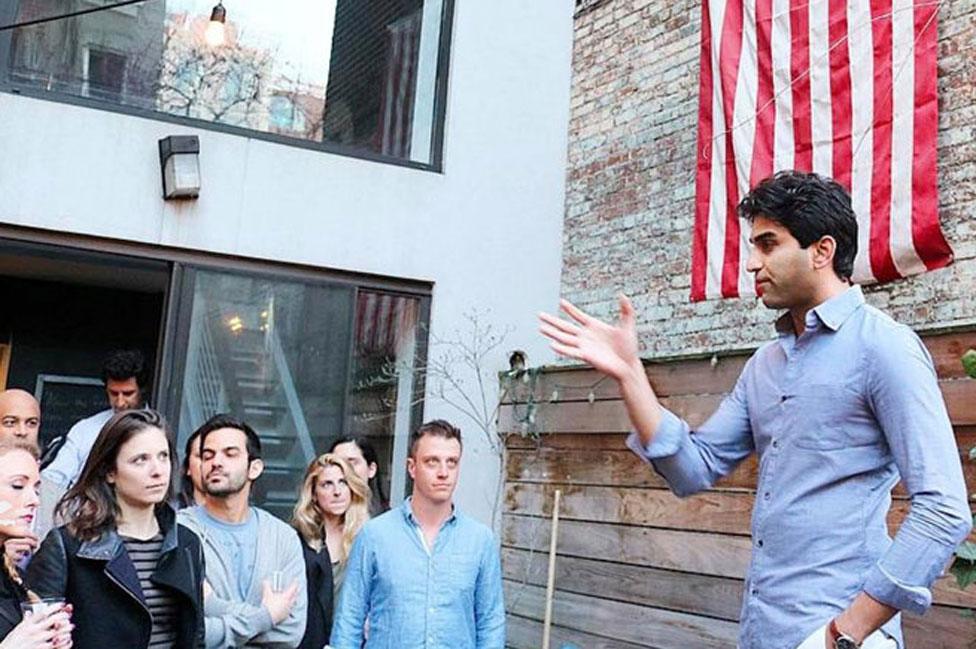Is it fair for a politician to use Tinder to win votes?
- Published

Patel says it's time to try new tools of campaigning
Political campaigns are desperate to find new ways to reach voters.
But that's not easy in an age when many Americans - particularly young adults - barely answer the phone when it rings and skip over or filter out television, radio and internet advertisements.
With that in mind, a Democratic candidate in New York City is trying his hand at Tinder and other dating apps - not in search of romantic companionship, but to start conversations about his campaign.
He is trying on Tuesday to unseat a long-time Democratic incumbent in the state's congressional primary - a contest where the party picks its candidate for November's congressional election.
Suraj Patel, president of a hotel management company and Obama presidential campaign veteran, recently hosted a "Tinder banking" party, where he and his campaign aides logged into accounts on dating apps in an unconventional attempt at voter outreach.
The accounts, and attractive photographs of would-be suitors, weren't always their own - Mr Patel's, for instance, used that of his brother.
According to campaign spokesperson Lis Smith, the Tinder banking is part of a concerted effort to find voters "where they are". She notes that in the district's 2016 New York Democratic primary, only 2% of 18-to-34-year-olds turned out to cast ballots.
"Clearly traditional forms of campaigning - phone banking, knocking on doors - wasn't working here anymore," she says.
The Patel campaign tactic first received prominent coverage in a New York Times article, external last week about Mr Patel's uphill race against 26-year incumbent Carolyn Maloney, and the reaction came swiftly.

Tinder is one of the most popular dating apps
"This is so disgusting," tweeted David Nir, external, political director for the liberal activism website Daily Kos. He added that it was "using deceit to win voters".
California-based writer Amanda Smith, who has accounts on several dating apps, noted that Patel's Tinder strategy probably won't reach many registered New York voters, given the high number of out-of-town college students who live in the district.
More than that, she says, the campaign tactic was "dangerous and cynical" - taking advantage of people's hope for a connection.
"When you're a woman on a dating app, every time that you swipe right on someone you're investing in the idea that this might be a person who is who they say they are and won't rape or murder you," she says. "You take that leap every single time. This just reinforces that no one is who they say they are."
Lis Smith counters that the campaign accounts were clearly identified as such (if you read the profile) and the reaction to these encounters has been "consistently positive" and helped the campaign reach and engage with hundreds of potential voters.
"We're not surprised that the political establishment is sneering at our campaign trying new tactics, but on this campaign we're willing to take some risks," she says. "We're not going to be snobs about getting people involved in the political process."
As for whether the Tinder strategy is effective, Ms Smith says they were inspired to try it after reading about a similar effort by activists in the UK that may have contributed to the Labour Party's surprisingly strong results in last year's general election
Yara Rodrigues Fowler and Charlotte Goodman created an automated Tinder bot to contact voters in marginal constituencies and conduct voter outreach "conversations" to inform them of Labour Party priorities and polling place information.
"Tinder is an intimate medium," they wrote in a New York Times opinion piece, external last June about their efforts.
"When you're on your way home from work and someone stops you in the street, you're busy: You don't want to listen. But on Tinder, people want to talk, and they talk candidly. It's not unusual to disclose a taboo sexual preference in an opening message. And the political is personal."

Fowler said there was very little negative feedback about the tactics used in the UK
Unlike Mr Patel's tactics, the Labour bot exclusively relied on actual Tinder accounts - with the user's permission. The initial conversations were automated, but a real person could take over at any point.
Fowler and Goodman say their bot sent between 30,000 to 40,000 messages over the course of the campaign, which ended up with the highest young voter participation rate in 25 years.
"Talking politics on Tinder works because your matches are waiting for you to say something personal to them," they wrote. "And they are willing to listen."
We have asked Tinder to comment on Mr Patel's use of the app. Tinder's terms of use, external prohibit the use of bots and "third-party applications" that interact with members and ban the unauthorised use of the service for "commercial purposes".
The company has tried cracking down on fake accounts as well, although there's no explicit requirement that accounts accurately represent real people.
It's a problem the service has confronted- with mixed success - in the past.
And while those in the market for love may be willing to listen to a pitch for civic engagement every now and then, too many solicitations of the non-romantic kind and the audience might start tuning out.
"No-one trusts politicians anyway," Amanda Smith says. "Why do you have to double down on that?"